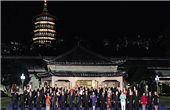G20 Hangzhou Summit Points the Way for the World Economy
China Today by He Yafei, October 13, 2016 Adjust font size:
Decisions were also made to transform the G20 from a crisis response mechanism to a long-term governance mechanism, and expand its focus from short-term policy response to a combination of short-, medium- and long-term policymaking.
Leaders showed their determination to improve global economic and financial governance to enhance the resilience of the world economy. Furthermore, they agreed to advance the quota and governance reform of international financial institutions, broaden the use of Special Drawing Rights (SDR), enhance international cooperation on taxation, energy resources, and anti-corruption, as well as join hands to deal with global issues like climate change.
China has earnestly practiced what it preaches and played a leading role in this regard. Before the meeting, China and the U.S. jointly deposited their legal instruments of joining the Paris Agreement.
China’s greater participation in the G20 mechanism and global governance reveals that the relations between this responsible major country and the world are changing, and with historic significance. At the summit, Chinese President Xi Jinping pointed out that China has reached a new historical starting point wherein the country will deepen reform across the board, foster new drivers of economic and social development, adapt its economy to the “new normal” stage and transform its growth model, further globally integrate itself, and increase worldwide exposure. Increased interaction and greater openness highlight the new starting point of the relationship between China and the world.
The Belt and Road Initiative, first proposed by President Xi in 2013, has been warmly welcomed by over 100 countries. Under the guiding principle of “jointly building through consultation to meet the interests of all,” China has signed cooperation agreements with more than 30 countries along the routes and launched international production capacity cooperation with 20 plus countries. Many countries have benefited from the cooperation with China.
The Belt and Road Initiative shows China’s determination to open to the world – both to developed countries and developing countries. On top of that, China initiated the establishment of the Asian Infrastructure Investment Bank and the Silk Road Fund with the aim of providing new financing channels for developing countries to build up their infrastructure.
China has no intention of overturning the current system and setting up a brand new one. Cooperation and mutual benefits are the goal of the new mechanisms and initiatives launched by China. Its objective is not to build China’s own backyard garden, but a garden shared by all countries. In the field of global economic and financial governance, China is playing a leading role in a substantial way.
China’s international production capacity cooperation is misinterpreted by some Western critics as a way of “letting out its domestic problems.” But facts speak for themselves. The Belt and Road Initiative is widely welcomed; the philosophy it holds of cooperation and mutual development was echoed at the Hangzhou Summit. The country’s leaders have on different occasions expressed that all countries are welcome aboard the train of China’s development to share the fruits of its progress.
The world has complimented the Hangzhou Summit for the tangible outcomes it has achieved, the hope it brings to global economic growth, and the direction in which it points for a global governance system. However, quite a few people throughout the world still uphold neoliberalism, even though the philosophy has been disputed in the wake of the financial crisis. More effort is required to dispel neoliberalism and lead the world economy towards a more equitable global economic governance system that is more just, fair and reasonable.
HE YAFEI is the first G20 sherpa for China, former deputy foreign minister and former deputy director of the Overseas Chinese Affairs Office of the State Council.

